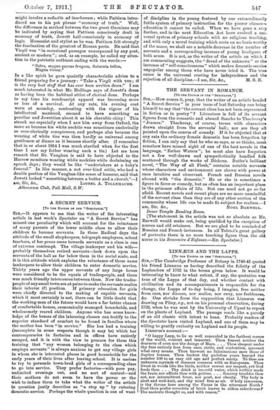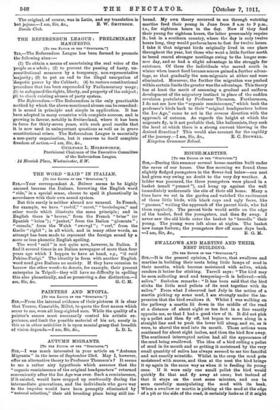LINN2EUS AND THE LAPPS. [To THE EDITOR OP THE "SPECTATOR. " ]
Sin,—The Cambridge Professor of Botany in 1740-41 quoted his friend Linnaeus as having described the felicity of the Laplanders of 1732 in the terms given below. It would be interesting to know to what extent, if any, the quotation was
true of the Lapps of that day, and whether contact with civilization and its accompaniments is responsible for the change, the Lapps of to-day being, I imagine, free neither from care, nor disease, nor malice, nor envy, nor feebleness, &c. One shrinks from the supposition that Linnaeus was drawing on Pliny, e.g., not on his personal observation, during 1732, when he was sent by the University of Upsal to report on the plants of Lapland. The passage reads like a parody of an old classic with intent to hoax. Probably readers of the Spectator have visited Lapland, and one of them may be willing to gratify curiosity on Lapland and its people. Linnleus's account :-
" 0 happy Lapp, to lie so well concealed in the farthest corner of the world, content and innocent. Thou fearest neither the dearness of corn nor the doings of Mars. . . . Thou sleepest under thy furs entirely free from care, strife, and contention, ignorant what envy means. Thou knowest no fulminations save those of Jupiter tontine. Thou leadest thy guileless years beyond the number 100 to an easy old age and perfect sanity. To thee are unknown myriads of diseases common with us Europeans. Thou livest in woods like the birds, neither sowest nor reapest, yet God feeds thee. . . . Thy drink is ice-cold water, which neither mads the brain nor afflicts thee with goitres. . . . Scurvey troubles thee not, nor intermittent fever, nor gout, nor obesity. Thy body is alert and well-knit, and thy mind free as air. 0 holy innocence, is thy throne here among the Fauns in the uttermost North? Dost thou prefer coverlets of birch leaves to silken eiderdowns? The ancients thought so, and with reason."
The original, of course, was in Latin, and my translation is































































 Previous page
Previous page